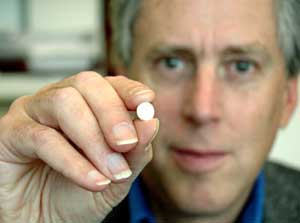Common Pain Relief Medications May Increase Heart Attack Risk in Individuals Over 60 with Weak Hearts, According to New Study
The risk is even higher for those who have previously experienced a heart attack. Even short-term use of pain relief medications can be dangerous, particularly for those taking blood pressure-lowering drugs.
The pain relief medications discussed in this study are known as “nonsteroidal anti-inflammatory drugs” (NSAIDs). Common NSAIDs include the following medications:
-
Indomethacin (brands such as Indocin, Indocin SR).
-
Naproxen (brands such as Aleve and Naprosyn).
-
Ibuprofen (brands such as Advil and Motrin).
 |
|
Nonsteroidal Anti-Inflammatory Drugs (NSAID) – Image: fhcrc.org |
The study, led by Dr. Consuelo Huerta from the Spanish Center for Pharmaco-epidemiologic Research in Madrid, examined data from 228,660 patients collected in the United Kingdom between 1997 and 2000.
While NSAIDs increase risk among patients with heart weakness, in general, they do not pose a risk to most other individuals, according to the research team.
Dr. Huerta and her colleagues wrote in their report: “The use of NSAIDs carries a small risk of patients being hospitalized for the first time due to a heart attack. For patients who have been previously diagnosed with heart issues, the use of NSAIDs may exacerbate their heart condition and lead to hospitalization.”
The study was published on the website of the journal Heart, based in London, UK.
These new findings did not surprise heart experts, according to Dr. Andrew L. Smith, a cardiologist at Emory University in Atlanta.
He stated in an interview with WebMD: “The data from this study is not surprising to those of us who routinely care for many patients with a history of heart attacks. NSAIDs can raise blood pressure. However, this is often overlooked by primary care providers [family physicians]. This is a concerning situation, as many cardiac patients also frequently suffer from arthritis and other painful conditions that require these medications for pain relief.”
Dr. Smith explained that the issue is not that NSAIDs are directly toxic to the heart, but rather that their mechanism of action counteracts the effects of blood pressure-lowering medications. For patients whose lives depend on medications that help reduce their blood pressure, the impact can be serious and sudden.
Dr. Smith added: “In our hospital, we can observe the immediate effects when a patient with severe heart disease takes NSAIDs. The day before, their diuretic [which helps lower blood pressure] was effective. The next day, fluid retention in their body can lead to hospitalization. The severity of the outcome depends on their heart condition.”
Dr. Homeyar Dinshaw, a cardiologist at Ochsner Clinic, advised patients who need to use NSAIDs to closely monitor signs of fluid retention.
He said: “Recently, I have begun advising patients that if they take NSAIDs, they need to monitor their fluid retention by checking their weight at the same time each morning. At other times, I tell them to observe the skin below the line of their socks. If you press your finger on the surface just above your ankle and see a dent in the skin, it means your body is retaining water.”
Dr. Smith recommends that individuals with heart conditions who need pain relief should consider using acetaminophen, such as Tylenol, instead of NSAIDs.


















































